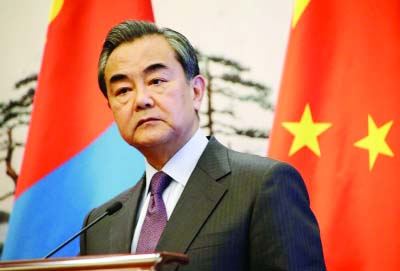
If the rhetoric and military posturing keeps up, the U.S. and North Korea are destined to collide, a senior Chinese politician reportedly said Wednesday local time. The words seemed to hint that war between the two countries was all but inevitable.
“The U.S. and North Korea are like two accelerating trains speeding towards each other with neither side willing to give way,” Yang Wi told reporters during a media briefing in China, according to the Guardian’s reporter Tom Phillips.
Wi touched on a number of topics during the media briefing, including making a case for the U.S. and China to increase cooperation. “There is a compelling reason for China and the US to respect each other,” Wang said. “Our interests are intertwined.”
Wang’s comments came just about 24 hours after the U.S. moved an advanced Terminal High-Altitude Area Defense system (THAAD) to South Korea, an action that prompted the Chinese foreign ministry to threaten “consequences” to the American military. “We solemnly object to South Korea and the U.S.’ deployment of THAAD and will resolutely take necessary actions in order to safeguard our security interests,” the Chinese foreign ministry said Tuesday. “Any consequences to follow the necessary actions should be bore by South Korea and the U.S. We strongly demand that the parties halt the THAAD deployment process immediately and not deviate to the wrong path any further.” Wang also reportedly expressed China’s solidarity with North Korea, saying the two countries remained as close as “lips and teeth.”
North Korea test fired five ballistic missiles that landed in the Pacific Ocean near Japan on Monday, prompting the U.S. to move the advanced missile system into the region to Seoul. China and North Korea condemned the move as being a threat to their respective national securities. Confirming what was already suspected, the missiles launched were being tested in preparation for a strike against a U.S. military base in Japan, North Korea said Tuesday.
The U.S. has sent an advanced military defense system to South Korea in response to North Korea recently launching a series of missiles, inciting the anger of both China and Russia with each country condemning the move as threatening their respective security.
Seoul received the Terminal High-Altitude Area Defense system (THAAD) on Tuesday, one day after Pyongyang test-fired four ballistic missiles that landed in the Pacific Ocean near Japan, South Korea news outlet Yonhap reported.
China seemed to hint that the deployment could result in a military response.
“We solemnly object to South Korea and the U.S.’ deployment of THAAD and will resolutely take necessary actions in order to safeguard our security interests,” the Chinese foreign ministry said Tuesday. “Any consequences to follow the necessary actions should be bore by South Korea and the U.S. We strongly demand that the parties halt the THAAD deployment process immediately and not deviate to the wrong path any further.”
Likewise, Russia, which is located nearby, was also impacted by the setting up of THAAD in South Korea, Russian owned news outlet Tass reported.

